Archive for May, 2011

The manipulation of Christ
Pagans, infidels, and blasphemers are usually (dis)credited for supporting what some consider to be the detrimental, offensive, and at most extreme sacrilegious, doctrine of separation of church and state. In Cayman we point north to the United States as an example of what happens to a nation when “God” is taken out of the decision making systems of a government.
The US is the political version of the cautionary tales of our youth as political leaders will not fail to tell us that such would be our fate should we choose to embrace said concept.
What then is one to make of the believer who supports said doctrine, not because of the assumed “allowances” that it makes for immoral but not illegal actions on the part of politicians, but instead out of a sense of protection, respect and true deference to something that is so personal and sacred as one’s faith?
It has become more commonplace for people in our Islands to refer to our “Christian” nation while pointing out the numerous shortcomings and contradictions which are becoming more blatant as social unrest grows and meaningful strategies to combat this trend are nowhere in sight.
The word“Christian” and references to “Christian principles” are said with utter disdain, as the hypocrisy of the reality of Cayman and this self-imposed sense of grand moral and ethical standing drips from our mouths as it sours our tongues and our hearts in the face of so much lip service and so little Christian-like action.
We are told that our Christian heritage is under attack by these “outside influences” who wish to take Cayman and its people away from its “roots” and “God-fearing” ways.
The truth is that Cayman’s Christian heritage IS under attack and in many ways we have already lost our roots. The uncomfortable second half of that reality is that the culprits are not outsiders but the very people who profess their “godly” ways to any and all who will listen.
The very “Christians” who will choose to evoke Jesus and His teachings by quoting scripture as fuel at political rallies, those who use their faith as justification without reason or thought for decisions and comments made at the Legislative Assembly, and most recently those who will bring their Sunday fervor to the courtroom as a distraction and a LEGAL TACTIC; these are the people making a mockery of their “beloved” faith.
Christianity is the smoke and mirrors to divert attention from the issue at hand. Call on the Lord enough times, sing enough songs, make enough references to the external forces of evil and poof: crisis averted.
There are those within our political leadership who will go as far as talk about their trials and tribulations, their personal persecutions, the victimisation which they have suffered, all the while drawing imagery from the crucifixion of Christ as if there was a parallel between being a politician in Cayman in the 21st century and the Christian Savior who was nailed to a cross.
It begs the question: how are these actions NOT offensive to Christians? If we are to believe that the majority of our people believe the story of Jesus to be the truth, share this faith and its values, how is it that they have not joined forces to decry these truly sacrilegious comparisons?
“Politicians will be politicians, and will use whatever tool they can to gain support, further their cause, and fill their pockets.” That is the argument which we will make in an effort to explain or justify this behaviour, though it is completely contrary to those values which they so vehemently proclaim to hold. In that way, even though we would like to hold ourselves to higher standards, Cayman is like every country in the world.
What then of the lack of acknowledgment, much less response, on the part of our moral leadership on this clear manipulation of Christian doctrine?
One’s inner pagan will guffaw at the question given the churches’ own sordid history with the manipulation of Christian doctrine, but let us put our scepticism aside (how jaded our lot) and acknowledge that there are churches who are undertaking their God given missions. How much more disturbing is the perception that the churches’ silence on this matter has been bought by the patronage, now called “nation building”, of these same individuals?
If the hope was, from the church perspective, that the lack of separation would assist in maintaining the churches’ influence on the government and as such keep our nation from “straying” from the Christian path, then perhaps now they can see just how clearly mistaken they were. In fact, turn on the radio and listen to truly concerned believers talking about the undue influence that politicians have on their places of worship – with some even claiming that certain individuals “own” particular churches.
Christianity in Cayman has been reduced to currency. It opens doors, it assists in making transactions, it gives you facetime with the “right” people, it gives you a job, and it certainly gets you votes.
Like currency, Christianity is recognised to have worth within our community, but whether it is of any actual value to the individual who spews said doctrine in every occasion is questionable at best.
If Christians continue to condone this manipulation of their faith in the most prominent and visible stage (nationally and internationally), then their beliefs will continue to play an unflattering and antiquated leading role in the circus which has become our political arena, and thus will continue to be fair game in the criticisms and observations about the failings of our society. After all, if the believers of a particular faith fail to respect it, why should those outside of it act any differently?
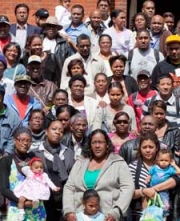
Banished Chagos islanders still want to return
 (The Guardian): Whatever joy Bernadette Dugasse felt about returning to the island she last saw as a toddler 52 years ago shrivelled the moment she saw the remnants of the coconut plantation. "There was nothing there. It was all gone – only the big house where the manager used to live is there. And the church and the prison," she said. "I felt sad and depressed as if I wanted to shout, but I just cried." The scene behind the white-painted walls of the plantation house was bleakerstill. "Inside it was filthy and disgusting and broken everywhere. The roof is coming off, the kitchen is rusted and broken and there's an old broken wardrobe in there. You have to be careful where you put your feet otherwise you might have an accident.The chapel was filthy with pigeon poo."
(The Guardian): Whatever joy Bernadette Dugasse felt about returning to the island she last saw as a toddler 52 years ago shrivelled the moment she saw the remnants of the coconut plantation. "There was nothing there. It was all gone – only the big house where the manager used to live is there. And the church and the prison," she said. "I felt sad and depressed as if I wanted to shout, but I just cried." The scene behind the white-painted walls of the plantation house was bleakerstill. "Inside it was filthy and disgusting and broken everywhere. The roof is coming off, the kitchen is rusted and broken and there's an old broken wardrobe in there. You have to be careful where you put your feet otherwise you might have an accident.The chapel was filthy with pigeon poo."
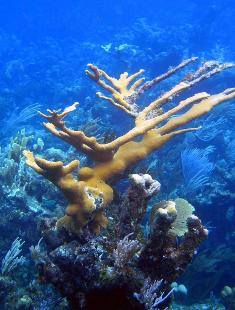
Scientists aim to create coral reef sperm bank
 (CNS): Researchers at the Smithsonian Conservation Biology Institute and partnering organizations intend to create a frozen repository of Great Barrier Reef coral sperm and embryonic cells, a release from the institute has revealed. Genetic banks composed of frozen biomaterials hold strong promise for research and conservation of species and genetic variation. Scientists said that because the banked cells are alive, researchers can thaw the frozen material one, 50 or, in theory, even 1,000 years from now to help restore a species or diversify a population. Over time experts hope frozen samples can be reared and placed back into ecosystems to infuse new genes into natural populations.
(CNS): Researchers at the Smithsonian Conservation Biology Institute and partnering organizations intend to create a frozen repository of Great Barrier Reef coral sperm and embryonic cells, a release from the institute has revealed. Genetic banks composed of frozen biomaterials hold strong promise for research and conservation of species and genetic variation. Scientists said that because the banked cells are alive, researchers can thaw the frozen material one, 50 or, in theory, even 1,000 years from now to help restore a species or diversify a population. Over time experts hope frozen samples can be reared and placed back into ecosystems to infuse new genes into natural populations.
“It is crucial that we begin ex situ conservation on coral reefs while their genetic diversity is still high,” said Mary Hagedorn, a marine biologist at SCBI. “Although we hope we’ll never need to use these banks, the cost of not doing this work and subsequently losing valuable diversity and resources is too high.”
Hagedorn recently created the first frozen repositories for endangered elkhorn coral, Acropora palmate, and Hawaiian mushroom coral, Fungia scutari. Researchers have used these repositories to fertilize fresh coral eggs. SCBI is joining with organizations in the United States and Australia, including the Australian Institute of Marine Science, Monash University and the Taronga Zoo in Sydney, to freeze sperm and embryonic cells from the Great Barrier Reef’s staghorn coral, A. millepora.
Coral reefs are living, dynamic ecosystems that provide invaluable services: they act as nursery grounds for marine fish and invertebrates, provide natural storm barriers for coastlines, purify carbon dioxide from the atmosphere and are potential sources for undiscovered pharmaceuticals. Yet coral reefs are disappearing rapidly as the result of pollution from industrial waste, sewage, chemicals, oil spills, fertilizers, runoff and sedimentation from land, climate change, acidification and destructive fishing practices.
Researchers believe that coral reefs and the marine creatures that rely on them may die off within the next 50 to 100 years, causing the first global extinction of a worldwide ecosystem in current history. According to the Pew Center on Global Climate Change, coral reefs generate up to $30 billion of the global economy each year, with more than $1 billion going to the Australian economy.
“The Great Barrier Reef is iconic and of vast importance in terms of biological diversity and species richness,” Hagedorn said. “A frozen repository will help ensure its incredible diversity and prevent future extinctions.”
While scientists have successfully used frozen sperm from coral to fertilize fresh coral eggs, their next focus is on developing techniques to use frozen coral embryonic cells to help restore coral populations. This research will play a large role in helping to conserve the Great Barrier Reef, which stretches 1,800 miles along the Queensland coast of Australia and includes the world’s largest collection of corals.
The Smithsonian Conservation Biology Institute serves as an umbrella for the Smithsonian Institution’s global effort to understand and conserve species and train future generations of conservationists. Headquartered in Front Royal, Va., SCBI facilitates and promotes research programs based at Front Royal, the Smithsonian’s National Zoo in Washington, D.C., and at field research stations and training sites worldwide.
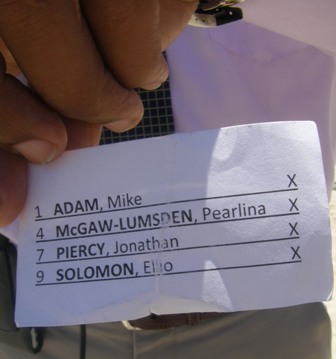
Election investigation closed
 (CNS):Two years after it was opened, the RCIPS has now confirmed that the investigation into voting irregularities at polling booths on General Election Day in May 2009 has been closed. A police spokesperson said that no charges would be brought as there was “insufficient evidence” to support them. The investigation was started as a result of reports first made at the George Town Primary School polling station that some UDP supporters were handing out small slips or cards to voters directing them to vote for the four UDP candidates running in the capital’s district. As handing out any material that could be seen as influencing a voter on the Election Day itself is illegal, the police were asked to investigate.
(CNS):Two years after it was opened, the RCIPS has now confirmed that the investigation into voting irregularities at polling booths on General Election Day in May 2009 has been closed. A police spokesperson said that no charges would be brought as there was “insufficient evidence” to support them. The investigation was started as a result of reports first made at the George Town Primary School polling station that some UDP supporters were handing out small slips or cards to voters directing them to vote for the four UDP candidates running in the capital’s district. As handing out any material that could be seen as influencing a voter on the Election Day itself is illegal, the police were asked to investigate.
Reports of irregularities were also made at polling stations in Prospect and West Bay, which, it was confirmed at the time by the Elections Office, suggested some political party volunteers may have been attempting to unduly influence voters. Election officials also reported that some voters had gone inside the polling stations holding the cards, and when asked where they came from, they indicated that they had just been given to them outside by UDP representatives.
Field agents representing other candidates in the area as well as voters and other candidates, including PPM George Town representative Alden McLaughlin, all said they had seen the cards, which were the size of a normal business card.
Furhter allegations were made by a number of observers that it was some of the George Town candidates themselves who had given the cards to their representatives at the tent to hand out to voters as they arrived. Election officials and the police were called to the polling station and an election office base was establishedby the election agent’s tents.
At the time Jonathan Piercy, one of the UDP’s four George Town candidates, said the accusations were merely hearsay and there was no proof that any had been given out by their people on Election Day as the cards had been in circulation for about a week.
Although candidates from both parties and the independents are allowed by law to have their representatives near the polling stations on Election Day, it is illegal to campaign or influence voters in anyway.
According to Section 92 (3) of the Elections Law, on polling day candidates are not allowed to publish any printed material which invites or induces the public to vote for a particular candidate or group of candidates and anyone contravening this section is liable to a fine of up to $500 or six months in prison. The question of undue influence, however, could also give rise to a more serious question of whether the vote and ultimately the result would be unfairly influenced.
Following the election in the first sitting of the new parliament on 27 May, Alden McLaughlin, a member for George Town who is now opposition leader, said he had seen the cards being given out.
“I sat in my car and asked a supporter of ours to attend the UDP tent, where she was handed (this) card with the four UDP candidates and their numbers and she was encouraged to vote for these four,” he said showing one of the cards to his legislative colleagues. “This is a pre-printed card, a clear indication of an organised effort to influence voters. We have a duty as candidates … to be sure that this kind of behaviour does not creep in and undermine the election processes.”
McLaughlin did state, however, that he did not believe the cards had necessarily impacted the vote.

Ex IMF boss released on million dollar bail
(AP) : Lawyers arguing whether ex-IMF chief Dominique Strauss-Kahn should get out of jail while he awaits trial on attempted rape charges have used two famous examples from different sides of the spectrum to make their case — Roman Polanski and Bernard Madoff. Prosecutors brought up Polanski, the French filmmaker whom U.S. authorities pursued for decades after he jumped bail in a 1977 child sex case. Defense lawyers have mentioned Bernard Madoff, the financier who was freed on high bail and strict house arrest, the same conditions that a judge approved Thursday in a bail package for Strauss-Kahn.
The onetime potential French presidential contender is charged with sexually attacking a New York City hotel maid. He denies the allegations. After Strauss-Kahn spent nearly a week in police custody and then jail, the judge agreed to free him on $1 million cash bail plus an additional $5 million bond — provided he's confined to a New York apartment, under armed guard and electronic monitoring.
Cayman businessman ordered to find US$14million
(Jamaica Gleaner): A Jamaican judge has ordered businessmen Delroy Howell and Kenarthur Mitchell to account for and repay any shortfall from US$14 million that a Turks & Caicos Islands-based firm – First Financial Caribbean Trust Company (FFCTC) – claims was leaked from its coffers when Howell and Mitchell were in control of it. In the summary judgment, Justice Patrick Brooks has also ordered that First Financial Jamaica, one of a slew of companies controlled by Howell under the First Financial banner, repay over J$146.36 million that was conceded to a debt to FFCTC and "any other monies found to be due to the claimant".
Howell, Mitchell, First Financial Jamaica as well as three other defendants – First Financial International Group, First Financial Caribbean Limited and First Financial Caribbean (Holdings) – were also ordered to pay profit/rent, the amount of which is to be the subject of mediation, for use of FFCTC resources and property that was transferred to them.
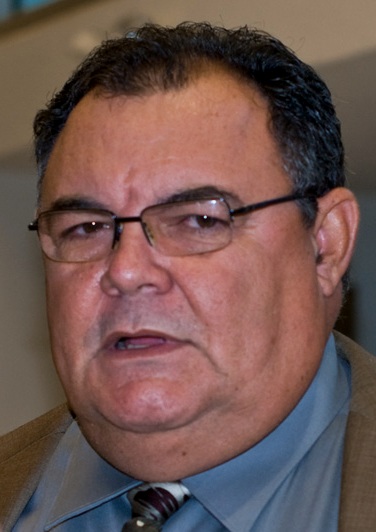
Miller: EIA reveals dangers
 (CNS): The independent member of the Legislative Assembly for North Side, who has been a vocal critic of the proposed East End commercial sea port, says the environmental impact assessment clearly shows that the project is far too risky given that there is no need for it. Ezzard Miller says the dangers admitted by the authors of the report will not be so easily mitigated as the EIA claims and the potential damage to the marine environment, in particular the reefs, along with the risks or flooding and many other negative impacts are too great when it is clear there is no necessity for a new cargo port in the district of East End.
(CNS): The independent member of the Legislative Assembly for North Side, who has been a vocal critic of the proposed East End commercial sea port, says the environmental impact assessment clearly shows that the project is far too risky given that there is no need for it. Ezzard Miller says the dangers admitted by the authors of the report will not be so easily mitigated as the EIA claims and the potential damage to the marine environment, in particular the reefs, along with the risks or flooding and many other negative impacts are too great when it is clear there is no necessity for a new cargo port in the district of East End.
“There is nothing in this EIA that surprises me as it has identified the same concerns that I have — except how easily the authors seem to think they can mitigate the dangers and risks that they admit the project would pose,” said Miller. “I do not see, for example, how the replacement of a 45 foot natural cliff with a man made 12 foot barrier could possible offer better protection from flooding. I also have concerns about how they could possibly move corals as easily as they claim.”
Miler pointed out that his fundamental objections remained the same, that there is no justification for the proposal and the developer does not have a proper business plan.
“Given the dangers and risk of damage that they admit, despite their claims at mitigation, when there is no justifiable need, how can this project possibly be allowed to go ahead?” he asked.
He noted that as Joseph Imparato has stated on several occasions that it is his intention to create the basic port structure, while government will be expected to complete the full infrastructure and roads. If government was to allow this now demonstrably risky project to go forward it would be the public purse that would have to find the money to compete the cargo port facilities, he said.
With so many commercial ports in the region being re-developed and news of a commercial port in Cuba, Miller said that Imparato’s claims that the country could tap into the transhipment industry are unconvincing. But he noted this was because the commercial port has always been and still is a red herring.
“We have always known that this project is about digging a quarry and then selling fill for other anticipated projects, such as the Shetty hospital or the latest Hon development proposal,” Miller said.
The EIA which was conducted by a private sector firm based in Florida was published by the developer in full on his website yesterday. The document reveals a considerable number of significant impacts on the land and marine environment, to the local community and to the water lens.
In each case, however, the EIA attempts to put forward a mitigating proposition such as collecting seeds and transplanting trees in response to the removal of five hundred acres of mature terrestrial environment, supporting an array of Cayman’s indigenous and endanger flora and fauna. It also speaks about moving live coral heads from the six acres of reef which will be destroyed if the project is given thego ahead by government.
Go to www.eastendseaport.com to see the EIA.
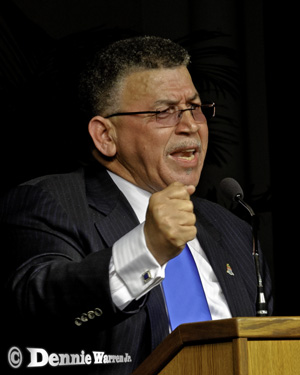
Mac declines to talk to CNS
 (CNS): As the current administration marks its mid-way point today, CNS had asked the premier if he would consider answering six questions about the last two years of his administration and the next two years ahead. Despite CNS’ best efforts to persuade him, McKeeva Bush declined as he said that CNS was erroneous and biased (as a boat jib) and there was too much hate from the bloggers. However, even though the premier decided not to answer us directly, over the last few weeks he has made a number of statements that suggest what he might have told CNS readers. (Photo by Dennie Warren Jr)
(CNS): As the current administration marks its mid-way point today, CNS had asked the premier if he would consider answering six questions about the last two years of his administration and the next two years ahead. Despite CNS’ best efforts to persuade him, McKeeva Bush declined as he said that CNS was erroneous and biased (as a boat jib) and there was too much hate from the bloggers. However, even though the premier decided not to answer us directly, over the last few weeks he has made a number of statements that suggest what he might have told CNS readers. (Photo by Dennie Warren Jr)
We had asked the premier what he considered his greatest achievement since taking office to be, his biggest challenge, if he would do anything differently, what he was looking forward to most, what he expected to be the toughest issue over the 2nd half of the term and how he felt this time in office compared to his time as leader from 2001-2005. Even though he did not answer, over the last few weeks the premier has made a number of statements that suggest what he might have said.
It is reasonable to assume, given his recent public statements, that Bush would have pointed to the reduction in the deficit as one of his greatest achievements. With the global economic recovery still slow government revenue remains down and at the same time cutting expenses is still proving tough. Bush has, however, recently stated on a number of occasions that his government has managed to stabilize public finances and reduce the public sector deficit.
Although it is still unclear whether government will manage to end the year $15 million in the black after ending last year with a $50 milllion deficit, Bush has made it clear to civil servants that he needs spending cuts that will deliver that surplus.
He would likely have told us that government has balanced the public books without introducing any direct taxes, despite the large public debt and the pressure from the UK. If Bush had opted to answer CNS, he would probably have also taken credit for getting Cayman off the OECD gray list and noted it as a significant achievement.
With none of the planned public-private projects which the premier was hoping would kick start the local economy having materialized and unemployment in the local population continuing to grow, Bush would likely have pointed to the stumbling blocks to the projects,in both the public and private sectors as the most pressing issue that he has not yet addressed.
Getting some projects off the ground is probably what the premier would also have pointed to as the key developments he is most looking forward to over the next two years.
With rumours of an imminent announcement about where Dr Devi Shetty will be developing his planned hospital project, Hon Development committed to building a technology park in a special economic zone and a new potential Chinese partner willing to take on the cruise port, and two other infrastructure projects, development is where Bush sees the country’s economic recovery and in turn his political fortunes.
Asked what he would do differently, despite the many controversies that have plagued his administration so far, it is difficult to say if the premier has any political regrets. The Cohen and Co financing deal, the controversy over the costs of his and other ministers’ globetrotting, the decision to take his pension as well as his salary, the recent move to cease talks with the second cruise port development project, the opposition to his desire to sell or lease the new government building, his controversial announcement about Dart and the landfill only weeks after the contract was awarded to another company, are just some of the things that he may on reflection, regret.
While there are many things that could present challenges for the administration over the coming two years, from the continuing opposition to certain key projects to the need to raise new revenue, it hard to predict with certainty what Bush would have said. However, whether the premier thinks so or not, making the necessary spending cuts across the civil service, while keeping those public sector workers on side, may prove one of the most challenging of all.
The perceptions of a continuing rise in crime, despite the police commissioner’s claim, is also continuing to be an issue which has dominated the last two years, and while Bush’s government like others before him is limited by the division of power, the implementation of the 2009 constitution now offers the country’s leader more influence on law and order when it comes to crime. While Bush may feel he cannot control this aspect of government as premier, there is still an expectation on him to at least be seen to be addressing what is, according to anecdotal evidence, the biggest concern of both the wider public and the business community.
Tackling the ever sticky issue of immigration is also likely to be on Bush’s agenda for the next two years and the evident lack of significant change to the law over the last two years is clear indication that getting it right is not as easy as politicians like to claim from the hustings.
Every administration has been challenged with finding the balance between the need to recruit specific skills and talents from overseas, with jobs for the local people. However, with unemployment rising significantly among the Caymanian population, that balancing act is even more difficult.
And finally, asked to compare this first two years with his previous term in office, I think we can safely predict that Bush would have derided the increase in bureaucracy, rules, and greater press freedom. An open critic of the public management and finance law, freedom of information and the new online commenters or bloggers as the premier has named them – which has certainly stuck – these are all new factors that he has been forced to contend with since he left office as Leader of Government Business in 2005 and ones he has made no secret he dislikes.
Support for the current administration is waning since they were voted into office on 20 May and most straw polls on CNS are revealing an average 25 percent approval rating for the his and his government’s performance. (Vote in the latest poll here).
However, the only poll that counts when it comes to politics is the one on election day and one comment that Bush made to CNS when he declined to answer the mid-way point questions was that his opponents will have to “stew for another two years.”
The questions that CNS put to the premier that were not answered are:
Q1. What do you believe is your greatest achievement as leader since taking office on 20 May 2009?
Q2. What do you consider to be the most pressing issue that you have not yet managed to address?
Q3. If you could do these two years over what would you do differently (if anything)?
Q4. What are you most looking forward to in the next two years?
Q5. What do you think will be the most difficult issue that you anticipate facing over the next half of this administration?
Q6. How does the last two years of this administration compare to when you were at the government helm between 2001-2005?
Similar questions have been posed to both the leader of the opposition and the independent member for North Side asking them about how they feel they have measured up in their respective roles since being elected on May 20 2009 and both have agreed to answer.
Watch out for those interviews which will be posted Monday.

Information boss to rule on withheld legal aid report
 (CNS): Following the denial of an FOI request made by CNS more than one year ago for a legal aid report, it will be the information commissioner who finally decides if it should be released or not. The document, which was finished in March 2010, has remained under wraps for almost 15 months as officials say it has still not been discussed by Cabinet. The report was written by a special commission that was established to review the legal aid system as a result of concerns raised in the wake of a government motion passed in a late evening sitting of the Legislative Assembly in 2009. The unannounced change not only reduced the legal aid budget but moved it from the independent jurisdiction of the courts into the political realm of the premier’s ministry.
(CNS): Following the denial of an FOI request made by CNS more than one year ago for a legal aid report, it will be the information commissioner who finally decides if it should be released or not. The document, which was finished in March 2010, has remained under wraps for almost 15 months as officials say it has still not been discussed by Cabinet. The report was written by a special commission that was established to review the legal aid system as a result of concerns raised in the wake of a government motion passed in a late evening sitting of the Legislative Assembly in 2009. The unannounced change not only reduced the legal aid budget but moved it from the independent jurisdiction of the courts into the political realm of the premier’s ministry.
The sudden decision after the annual budget of $1.8 million of financing had already been allocated to the judicial services department included a reduction of $500,000 in the legal aid allocation and an announcement by the premier that he intended to set up an independent legal aid clinic. The office, McKeeva Bush told his legislative colleagues in a Finance Committee hearing at around 9pm on a Friday night, would be established and managed by local attorneys Teresa Pitcairn and Steve McField.
With no input from the legal fraternity or judiciary and in light of an earlier law reform review that had indicated the administration of legal aid by the courts was value for money and a clinic would prove more expensive, the move by the premier caused controversy among the profession and uncertainty for local defence lawyers doing legal aid work.
Following the furore, the then governor Stuart Jack stepped into the fray and asked the premier to reallocate the missing funding to the courts. Although the government was entitled to consider how to manage the costs of legal aid, he said, human rights requirements had to be met and stakeholders consulted. Jack recommended that a committee examine the premier’s proposal.
“The government will, in the meantime, ensure that the current scheme administered by the Judicial Administration is adequately funded so that there is no disruption to the administration of justice through the courts,” he stated at the time.
A committee, chaired by Cheryl Neblett, was established to review the system, which included government backbencher MLA Elio Solomon, Steve McField (the attorney that government said would run the clinic) and two representatives from the courts. Although the committee was asked to conclude their work as quickly as possible, the findings in the report have never seen the light of day. The legal aid budget was never returned to the jurisdiction of the courts, despite the fact that the legal aid clinic was never established.
In January of this year, during the annual Grand Court opening session, the chief justice publicly called on government to return the budget back to the courts. Anthony Smellie said that although both the law and the country’s constitution placed the responsibility for legal aid and the duty to ensure fair trials on the courts, no budget had been allocated to them to as the money was given to the Ministry of Finance instead.
“While, as a purely administrative exercise, the bills are being paid as submitted by the judicial administration, we could not agree, as proposed by the ministry, that the ministry should be able to override the judiciary’s decisions, made under the law, to grant legal aid,” the chief justice said.
He pointed out that the subject of legal aid had been thoroughly examined and the existing system found to work well. Smellie called for the executive arm of government “to allow matters to return to normalcy”, suggesting that any necessary improvements to the existing system could readily be addressed.
CNS first began asking for the report, which is believed to support the CJ’s position, via a freedom of information request in April 2010 but we have persistently been denied access. As a result of a refusal by the chief officer after an internal review in January, CNS asked the information commissioner to intervene. After mediation with the finance ministry failed to produce a result, the ICO made the decision to move to a formal hearing.
The commissioner will now decide if the ministry’s continued refusal under Section 11(2)(b) of the FOI law, which allows a public authority to defer or refuse a document Law if it was for presentation to a particular body such as Cabinet or the LA, is still valid given the amount of time that has now lapsed.

Survey reveals steep increase in kids’ smoking
 (CNS): Despite trends in the developed world of a reduction in tobacco consumption by adults, teens are smoking more and that seems to be the case here in Cayman. According to the results of the latest student survey by the NDC, among grade 7-12 students the number of younfg people admitting to smoking has doubled. 14.4% of kids said that they had smoked a cigarette sometime in the year before the survey compared to less than 7% of the students that admitting smoking tobacco in the NDC’s 2006 survey. Almost 14% of Year 12 students admitted smoking in the last month. Despite the well documented dangers of smoking, 9% of kids said they did not think smoking one pack or more a day posed any risk.
(CNS): Despite trends in the developed world of a reduction in tobacco consumption by adults, teens are smoking more and that seems to be the case here in Cayman. According to the results of the latest student survey by the NDC, among grade 7-12 students the number of younfg people admitting to smoking has doubled. 14.4% of kids said that they had smoked a cigarette sometime in the year before the survey compared to less than 7% of the students that admitting smoking tobacco in the NDC’s 2006 survey. Almost 14% of Year 12 students admitted smoking in the last month. Despite the well documented dangers of smoking, 9% of kids said they did not think smoking one pack or more a day posed any risk.
The Cayman Islands Students Drug Use Survey (CISDUS) also indicated that despite the introduction of the tobacco law, which included a ban on promotion of cigarettes, vending machines, split packet sales, restrictions on where people can smoke and which made it illegal for people to sell tobacco to anyone under the age of 18, kids found getting hold of cigarettes very easy.
Less than half the children surveyed (46.4%) reported that they believed smoking one or more packs of cigarettes did pose a great risk to their health. Among the 743 students that reported ever smoking cigarettes, the average age of first use was 12 years old but almost a third of the children who were smoking said they had their first “whole” cigarette before they reached the age of 11 years old.
Although the World Health Organisation states that smoking is increasing in teens around the world, the findings in the Cayman survey among Year 12 students shows a greater number of smokers than their Canadian peers. Over 24% of Caymanian 17 and 18 year olds are smoking, while in Canada this figure is less than 20%. In comparison to a survey in Barbados, Cayman kids are ‘out-smoking’ them, as only 7.6% of 12th graders admitted smoking in that Caribbean island.
Although the survey found little difference between the genders in 2010 when it came to smoking habits, the rate of smoking among girls has increased even more than boys. In 2006 only 5.7% of female students had said they smoked but this year the figure increased to 14.8%, slightly higher than the rate among males of 14.2%. Grade 11 students admitted to being the heaviest smokers with more than 26% of those teens saying they smoked.
The district with the highest rate of smoking was Cayman Brac, while George Town was revealed to have the lowest percentage of student smokers.
According to the WHO, young adults are the most likely age group to smoke as smoking rates decrease as people get older. The global health organization said that globally one in five teens aged 13 to 15 smokes and as many as 100,000 children worldwide start smokingevery day. The WHO also states that there is evidence to show that around 50% of those who start smoking in adolescent years go on to smoke for 15 to 20 years. Peer-reviewed studies show teenagers are heavily influenced by tobacco advertising.